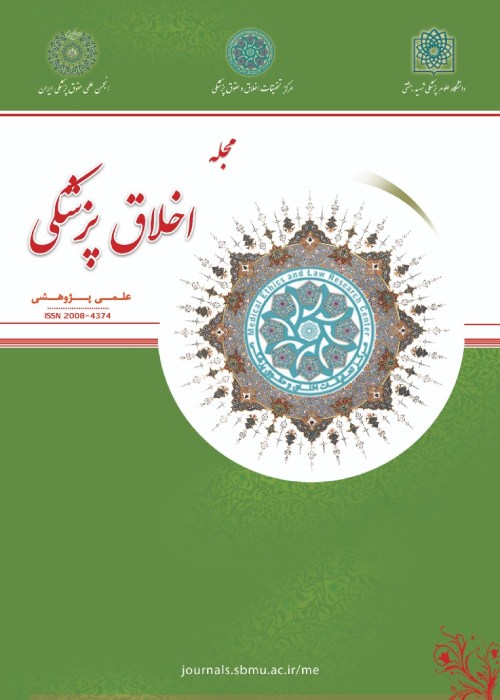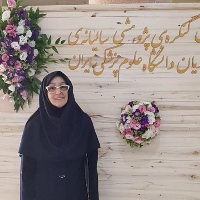Ethical challenges of decision making in treatment of a case of newborn with Down syndrome and intestinal obstruction
Author(s):
Article Type:
Research/Original Article (دارای رتبه معتبر)
Abstract:
Background And Aim
Despite of medical improvements and increase of survival rate of very premature and patient newborns, in recent years, ethics experts, medicine and parents are in doubt whether maintaining life works for infants that have a little chance for long term survival, is correct ethically or not. Down syndrome is of the most common chromosomal anomalies which almost is diagnosable at primary period after birth and about 10 percent of cases are with gastrointestinal disorders include intestinal obstruction, annular pancreas or imperforated anus. If Down syndrome accompanied with intestinal anomalies, risk of intestinal obstruction is high. As there are disagreements about life-saving treatments in infants and decision making in these patients in terms of medical ethics, this study has been done by the aim of determining ethical challenges in decision making in treatment of a case of newborn with Down syndrome accompanied with intestinal obstruction.Materials And Methods
The case is a three days boy infant with Down syndrome who is referred to pediatric special center from one of the hospitals of town by ambulance because of not eating milk and abdominal distention. In physical evaluation, distinct upward corner eyelid gap, epicanthic fold, convex and extruded tongue, short and wide hands, transverse fold in palm, straight club foot, severe hypotonia, fidget, clear abdominal distention and some degrees of respiratory distress were evident. Infant's mother was 35 years old, home wife and his father was worker and rural. Infant was born by natural delivery and was the yield of third pregnancy. There was any history of abortion, dead child and anomalies in infant family and mother just consumed mefenamic acid, diazepam and cephalexin for a short time. Mother was noticed her pregnancy accidently and had not done pre-pregnancy tests. Infant has been born on time with 3100g weight and Apgar 9-10 in a maternity center. Because of lack of any special problem at birth, except clubbing foot and Down syndrome face, infant was discharged 8 hours after birth by personal consent and without meconium excretion. Then, he had been brought to hospital because of not eating milk, two days after birth and primary procedures such as nasogastric tube insertion and fluid medication was done for him. Then, he was sent to city pediatric especial center accompanied with a nurse by ambulance for visiting by a surgeon and immediately was hospitalized in infant's special care. Primary procedures such as IV line, gastric sondage, vascular antibiotic medication, phototherapy and cardiac and surgery consultation. In surgery visit, probable diagnosis of perforation results from intestinal palsy was expressed and ordered to prepared infant for surgery. According to conditions, the surgeon expressed required explanation about infants situation and the necessity of surgery. Finally, patient's father expressed his disagreement for surgery after consulting with other family members (grandfathers and grandmothers). Despite supporting works, infant was died after two days of hospitalization in hospital.Ethical considerations: Meanwhile the observation of honesty and custody in case report, case and his family secrecy were observed.
Findings: Identified ethical problems in this special case, in born place hospital were: infant's discharge permission without meconium exertion, not evaluating Down syndrome in infant and other probable anomalies and not aware parents from infant's situation before obtaining permission of infant's discharge. Therefore, following questions and challenges will express in terms of medical ethics:According to the fact that meconium defecation is one of the criteria for discharging the infant, does respecting the parent's autonomy cause the right of infant's discharge by personal consent for parent? Or in the other word, had parent been able to decide for infant and recognize infant's discharge without explaining and enough understanding of infant's situation by personal consent as the best interest for him? Or Down syndrome appearance of infant causes that treatment team did not pay attention to him and also parent for more evaluations in infant? One of the bigger ethical challenges in this case was the diagnosis for the best interest for infant and correct decision making for medical action (surgery or not surgery for infant):Had surgeon's following of parent decision for avoiding of medication in destination hospital been proposed because of diagnosing being useless medication or low quality of infant's life after surgery? Or had cases such as infant's abnormality, surgery operation's cost and non-desiring of parents been cause not to do the surgery?
Conclusion
Decision making about medication of infants born with anomalies, especially in situations in which facilities are insufficient, is a difficult process that encounters officials of health and parents with ethical dilemma. Considered ethical problems and challenges in this study express decision making complications and their importance in life-saving medications in severe patient infants. Therefore, developing evidence-based clinical guidelines and establishing a committee composed of infant's experts and other medical ethics specialties can help to correct decision making and the best selection for their children by evaluation of scientific evidences and based on infant and his family conditions. In addition to avoid from futile care, this causes to select the best interest for infant by contribution of parents. Moreover, evaluation believes and common thoughts of the people and also of the medical personnel is recommended in order to develop evidence-based national guidelines.Keywords:
Language:
Persian
Published:
Journal of Medical Ethics, Volume:11 Issue: 41, 2017
Pages:
69 to 76
magiran.com/p1772289
دانلود و مطالعه متن این مقاله با یکی از روشهای زیر امکان پذیر است:
اشتراک شخصی
با عضویت و پرداخت آنلاین حق اشتراک یکساله به مبلغ 1,390,000ريال میتوانید 70 عنوان مطلب دانلود کنید!
اشتراک سازمانی
به کتابخانه دانشگاه یا محل کار خود پیشنهاد کنید تا اشتراک سازمانی این پایگاه را برای دسترسی نامحدود همه کاربران به متن مطالب تهیه نمایند!
توجه!
- حق عضویت دریافتی صرف حمایت از نشریات عضو و نگهداری، تکمیل و توسعه مگیران میشود.
- پرداخت حق اشتراک و دانلود مقالات اجازه بازنشر آن در سایر رسانههای چاپی و دیجیتال را به کاربر نمیدهد.
دسترسی سراسری کاربران دانشگاه پیام نور!
اعضای هیئت علمی و دانشجویان دانشگاه پیام نور در سراسر کشور، در صورت ثبت نام با ایمیل دانشگاهی، تا پایان فروردین ماه 1403 به مقالات سایت دسترسی خواهند داشت!
In order to view content subscription is required
Personal subscription
Subscribe magiran.com for 70 € euros via PayPal and download 70 articles during a year.
Organization subscription
Please contact us to subscribe your university or library for unlimited access!




